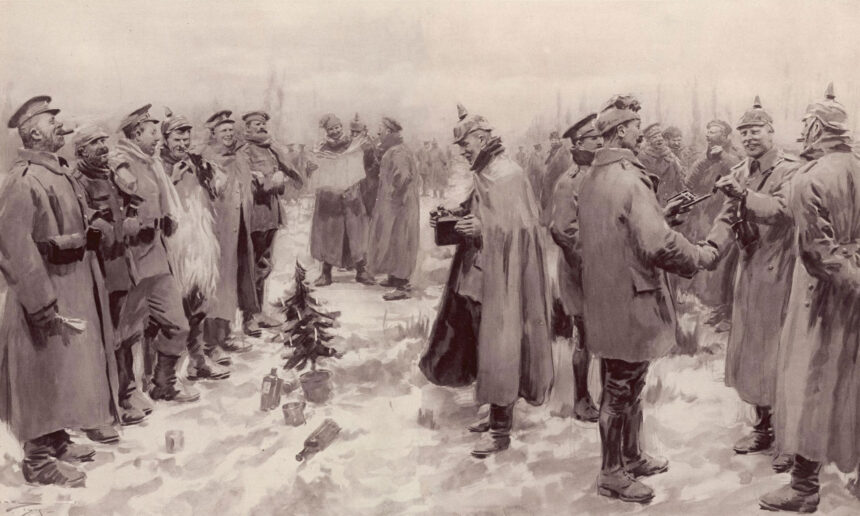“Christmas Truce in the Trenches” reminds us that even amid battle, the power that is Christmas can cause opposing forces to come together.
Celebrating Christmas in song is a long-held tradition and goes as far back as 129 AD in Rome. St. Francis of Assisi became known as the “Father of Caroling” ever since he built a Christmas creche to teach people about the birth of Jesus in song in 1223 AD. During Victorian times in the 1840s, people strolled the streets singing Christmas songs and spreading good cheer. The tradition carried over through generations in many countries, and Christmas songs have become an integral part of the celebrations surrounding the Christmas story.
Nowhere is the significance of Christmas more poignant than on the battlefield. Enemies spontaneously pause to share the joy of Christmas, which became known as the Christmas Truce. There have been instances recorded where outbreaks of Christmas carols silenced the horrors of war, if only for a short time. After World War I, the phenomena of the Christmas Truce faded as stories were dismissed as myth and legend, but also because the high command declared such truces unacceptable.
One undocumented incident is said to have occurred on Christmas Eve in 1871 during the Franco-Prussian War. While amid intense battle, a French soldier laid down his arms, stood up from his trench, faced the enemy, and began to sing “O Holy Night.” As he finished, a German infantryman was so moved that he began to sing a popular German Christmas carol, Martin Luther’s hymn “From Heaven Above to Earth I Come.” Met with praise from both sides, it was the beginning of a Christmas truce. The fighting stopped for 24 hours so that Christmas Day could be honored by the opposing camps.
In 1914, during World War I, the sweetly endearing Christmas carol “Silent Night” was famously sung on the battlefield during a temporary truce on Christmas Eve. Soldiers sang Christmas carols in their own language, and “Silent Night” was sung simultaneously in English, French, and German, giving all the warring sides a moment of true heartfelt peace. The Germans held up a pine branch with lit candles. Then, as the battle quieted, the opposing forces ventured into the treacherous No Man’s Land and exchanged seasonal greetings and meager gifts, offered assistance, and even enjoyed a friendly game of soccer. Hundreds, if not thousands, of troops participated in these truces.
In our imagination, perhaps the truce went something like the presentation in this video of a supermarket ad:
Kurt Zehmisch, a German Lieutenant of the 134 Saxons Infantry and schoolteacher, wrote a firsthand account of the impromptu soccer game. “Eventually, the English brought a soccer ball from their trenches, and pretty soon, a lively game ensued,” he wrote. “How marvelously wonderful, yet how strange it was. The English officers felt the same way about it. Thus Christmas, the celebration of Love, managed to bring mortal enemies together as friends for a time.”
Men who were dedicated to their causes were able to rise above the call to war with the call to peace. It is amazing that Christmas songs about the birth of Jesus can touch the hearts of fierce combatants causing them to lay down their arms and partake in peace on earth and good will toward men.
Learn more about this fascinating story by visiting The Christmas Truce of 1914.


